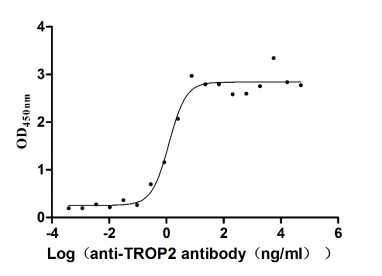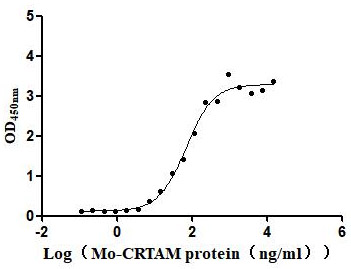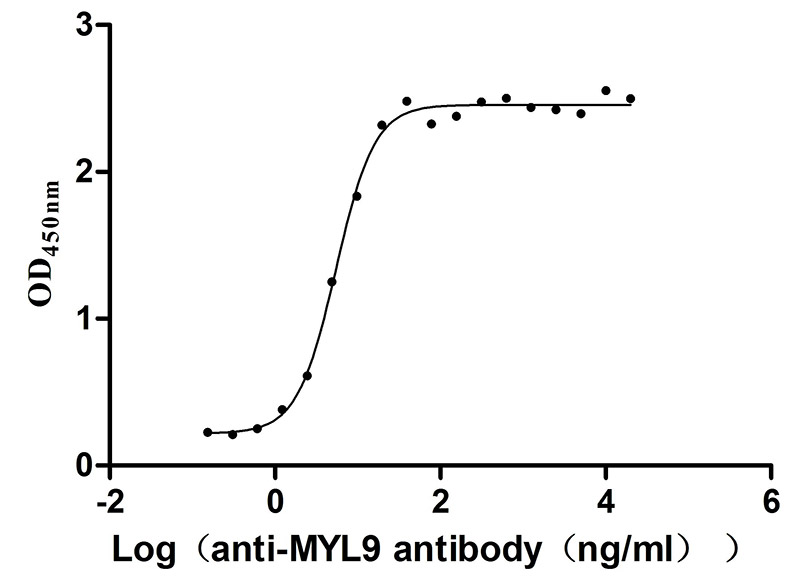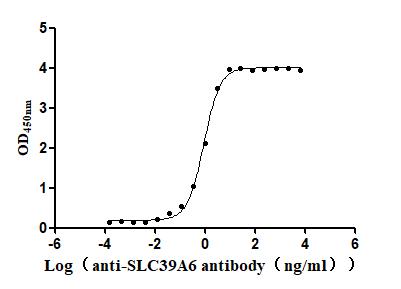Recombinant Human Partner and localizer of BRCA2 (PALB2), partial
-
中文名称:人PALB2重组蛋白
-
货号:CSB-YP017411HU
-
规格:
-
来源:Yeast
-
其他:
-
中文名称:人PALB2重组蛋白
-
货号:CSB-EP017411HU
-
规格:
-
来源:E.coli
-
其他:
-
中文名称:人PALB2重组蛋白
-
货号:CSB-EP017411HU-B
-
规格:
-
来源:E.coli
-
共轭:Avi-tag Biotinylated
E. coli biotin ligase (BirA) is highly specific in covalently attaching biotin to the 15 amino acid AviTag peptide. This recombinant protein was biotinylated in vivo by AviTag-BirA technology, which method is BriA catalyzes amide linkage between the biotin and the specific lysine of the AviTag.
-
其他:
-
中文名称:人PALB2重组蛋白
-
货号:CSB-BP017411HU
-
规格:
-
来源:Baculovirus
-
其他:
-
中文名称:人PALB2重组蛋白
-
货号:CSB-MP017411HU
-
规格:
-
来源:Mammalian cell
-
其他:
产品详情
-
纯度:>85% (SDS-PAGE)
-
基因名:PALB2
-
Uniprot No.:
-
别名:4732427B05; BC066140; DKFZp667I166; DKFZp686E1054; FANCN; FANCN GENE; FLJ21816; OTTMUSP00000025884; PALB2; PALB2_HUMAN; Partner and localizer of BRCA2; PNCA3; RGD1304759
-
种属:Homo sapiens (Human)
-
蛋白长度:Partial
-
蛋白标签:Tag type will be determined during the manufacturing process.
The tag type will be determined during production process. If you have specified tag type, please tell us and we will develop the specified tag preferentially. -
产品提供形式:Lyophilized powder
Note: We will preferentially ship the format that we have in stock, however, if you have any special requirement for the format, please remark your requirement when placing the order, we will prepare according to your demand. -
复溶:We recommend that this vial be briefly centrifuged prior to opening to bring the contents to the bottom. Please reconstitute protein in deionized sterile water to a concentration of 0.1-1.0 mg/mL.We recommend to add 5-50% of glycerol (final concentration) and aliquot for long-term storage at -20℃/-80℃. Our default final concentration of glycerol is 50%. Customers could use it as reference.
-
储存条件:Store at -20°C/-80°C upon receipt, aliquoting is necessary for mutiple use. Avoid repeated freeze-thaw cycles.
-
保质期:The shelf life is related to many factors, storage state, buffer ingredients, storage temperature and the stability of the protein itself.
Generally, the shelf life of liquid form is 6 months at -20°C/-80°C. The shelf life of lyophilized form is 12 months at -20°C/-80°C. -
货期:Delivery time may differ from different purchasing way or location, please kindly consult your local distributors for specific delivery time.Note: All of our proteins are default shipped with normal blue ice packs, if you request to ship with dry ice, please communicate with us in advance and extra fees will be charged.
-
注意事项:Repeated freezing and thawing is not recommended. Store working aliquots at 4°C for up to one week.
-
Datasheet :Please contact us to get it.
相关产品
靶点详情
-
功能:Plays a critical role in homologous recombination repair (HRR) through its ability to recruit BRCA2 and RAD51 to DNA breaks. Strongly stimulates the DNA strand-invasion activity of RAD51, stabilizes the nucleoprotein filament against a disruptive BRC3-BRC4 polypeptide and helps RAD51 to overcome the suppressive effect of replication protein A (RPA). Functionally cooperates with RAD51AP1 in promoting of D-loop formation by RAD51. Serves as the molecular scaffold in the formation of the BRCA1-PALB2-BRCA2 complex which is essential for homologous recombination. Via its WD repeats is proposed to scaffold a HR complex containing RAD51C and BRCA2 which is thought to play a role in HR-mediated DNA repair. Essential partner of BRCA2 that promotes the localization and stability of BRCA2. Also enables its recombinational repair and checkpoint functions of BRCA2. May act by promoting stable association of BRCA2 with nuclear structures, allowing BRCA2 to escape the effects of proteasome-mediated degradation. Binds DNA with high affinity for D loop, which comprises single-stranded, double-stranded and branched DNA structures. May play a role in the extension step after strand invasion at replication-dependent DNA double-strand breaks; together with BRCA2 is involved in both POLH localization at collapsed replication forks and DNA polymerization activity.
-
基因功能参考文献:
- Our data presented the germline mutation status of PALB2 in Chinese breast cancer patients, suggesting that loss-of-function germline mutations of PALB2 are important in both familial and sporadic breast cancer. Clinically, these data may be helpful in genetic counseling of breast cancer patients with PALB2 germline mutation. PMID: 28825143
- Truncating variants in PALB2, ATM and CHEK2 , but not XRCC2 were associated with increased breast cancer risk. PMID: 28779002
- PALB2 associates with active genes through its major binding partner, MRG15, which recognizes histone H3 trimethylated at lysine 36 (H3K36me3) by the SETD2 methyltransferase PMID: 28673974
- the involvement of PALB2 mutations in the predisposition to cancer and the role of PALB2 in stimulating error-free DNA repair through the FA/HR pathway. PMID: 28858227
- FANCD2 and PALB2, as indicators of the upstream and downstream arms, respectively, colocalize independently of each other in response to DNA damage. PMID: 27277787
- The findings demonstrate that RNF168 couples PALB2-dependent homologous recombination to H2A ubiquitylation to promote DNA repair and preserve genome integrity. PMID: 28240985
- The results of the present study suggest that mutations in the PALB2 gene may be particularly relevant to breast cancer susceptibility in the Jamaican population. PMID: 28194609
- We identified two PALB2 mutations that are founder alleles in Italian families, one of which is, independently, also a founder mutation in American-Hispanic breast cancers. PMID: 27624329
- Our results indicate that the PALB2 exon 13 duplication is a pathogenic variant. The presence of the PALB2 duplication in the proband affected with high-grade serous ovarian cancer suggests that PALB2 might be associated with a predisposition to ovarian cancer. PMID: 27757719
- We showed that the mutation frequency of RAD51C in Japanese familial breast cancer cases was similar to that in Western countries and that the prevalence of deleterious mutation of PALB2 was possibly lower. Furthermore, our results suggested that BRIP1 mutation frequency in Japan might differ from that in Western countries PMID: 28796317
- Study have shown that mutations in BRCA1, BRCA2, and PALB2 account for more than 10 % of breast cancer in Trinidad and Tobago. 25 different mutations identified; of these, four mutations were seen in two patients each. PMID: 27469594
- Germline mutations in the PALB2 gene were observed at a frequency of approximately 1.5% in Polish breast and/or ovarian cancer patients PMID: 28279176
- Prevalence of germline PALB2 mutations among women with epithelial ovarian cancer in Ontario PMID: 27631815
- inherited pathogenic variants in PALB2 were associated with high risks of breast cancer PMID: 28418444
- Findings establish L35P as the first pathogenic missense mutation in PALB2 and directly demonstrate the requirement of the PALB2-BRCA1 interaction for breast cancer suppression. PMID: 28319063
- In this paper, we describe an extension to the BOADICEA model to incorporate the effects of intermediate risk variants for breast cancer, specifically loss of function mutations in the three genes for which the evidence for association is clearest and the risk estimates most precise: PALB2, CHEK2 and ATM PMID: 27464310
- Data show an increase of error-prone single-strand annealing (SSA) and microhomology-mediated end-joining (MMEJ) in the PALB2 (partner and localizer of BRCA2) c.1592delT mutation carriers. PMID: 26640152
- Studies suggest that people with high risk of breast cancer and negative BRCA1/BRCA2 should be tested for PALB2 mutations. PMID: 28791855
- PALB2 rare variants were associated with an increased risk of breast cancer. PMID: 27595995
- our findings highlight a critical importance of PALB2 phosphorylation as a novel regulatory step in genome maintenance after genotoxic stress. PMID: 27113759
- identification of a hidden nuclear export signal (NES) within the WD40 domain of PALB2 and found that the W1038X truncation leads to the exposure of this NES to CRM1, an export protein PMID: 28158555
- PALB2 mutation along with BRCA1 mutation confers chemoresistance in breast cancer. PMID: 28124401
- Germline mutation in PALB2 gene is associated with neoadjuvant therapy response in triple negative breast patients. PMID: 27328445
- Germline PALB2 mutation was found in patients with hereditary and sporadic gastric cancer. PMID: 28024868
- PALB2 is involved in BC risk. PMID: 27648926
- we describe a genetic approach to examine the functional significance of the interaction between BRCA2 and PALB2 by generating a knock-in mouse model of Brca2 carrying a single amino acid change (Gly25Arg, Brca2G25R) that disrupts this interaction. In addition, we have combined Brca2G25R homozygosity as well as hemizygosity with Palb2 and Trp53 heterozygosity . PMID: 27490902
- Results identified novel intronic mutations in PALB2 gene associated with early-onset breast cancer patients from Turkey. PABL2 mutations accounted for 4.03 % in BRCA1/2-negative Turkish patients. PMID: 27573125
- rs120963 and rs249954 of the PALB2 gene are associated with increased breast cancer risk, and the association of rs249935 with breast cancer risk may be modified by the tumor pathological characteristics. PMID: 26981788
- PALB2 mutations are associated with susceptibility to Pancreatic ductal adenocarcinoma in the Czech Republic. PMID: 27106063
- PALB2 germline mutations are associated with breast and/or ovarian cancer. PMID: 26411315
- 87 out of 91 (95.6%) primary tumors were positive for PALB2 expression, as checked at the mRNA level. PMID: 26526077
- PALB2 mutations account for a small, but not negligible, proportion of patients with hereditary predisposition to breast cancer in the Xinjing region of China. PMID: 26489409
- a foundation for the formation and bioactivity of the G-quadruplex in the promoter region of PALB2 gene PMID: 26645143
- PALB2 mutations make a small contribution to the heritable breast cancer susceptibility in French population. PMID: 26564480
- Although patient cells were unable to form Rad51 foci following exposure to either DNA damaging agent, U2OS cells, in which the mutant PALB2 with in frame skip of exon 6 was induced, did show recruitment of Rad51 to foci following damage. PMID: 26990772
- The aim of this study was to determine the frequency and spectrum of germline mutations in BRCA1, BRCA2 and PALB2 and to evaluate the presence of the CHEK2 c.1100delC allele in these patients. PMID: 26577449
- PALB2 Mutation is associated with Breast Cancer. PMID: 26219241
- Novel PALB2 mutation was found in a cohort of Italian breast cancer patients. PMID: 25666743
- Germ-line DNA samples from 727 unrelated probands with positive family history (521 met criteria for familial pancreatic cancer) were tested for mutations in BRCA1 and BRCA2, PALB2, and CDKN2A. PMID: 25356972
- The truncating variants in PALB2 as high-penetrance breast cancer susceptibility alleles. PMID: 26283626
- Two novel heterozygous mutations predicted to alter the function of PALB2 were identified (c.2014G>C, p.E672Q and c.2993G>A, p.G998E). Notably, both of these mutations co-existed in BRCA1 and BRCA2 families PMID: 25833210
- Truncating PALB2 mutations were detected in families with breast cancer negative for which a BRCA1 or BRCA2 mutation has not been found. PMID: 25794774
- Our results suggest that PALB2 c.1676A > G and c.2993C > T play roles in BC risk in women with a strong family history of BC. PMID: 25636233
- This study showed the presence of a PALB2 truncating mutation in a case of male breast cancer. PMID: 25529982
- Overall our data do not support a case for PALB2 being associated with melanoma predisposition. PMID: 24949998
- Women with a PALB2 mutation face an increased risk of breast cancer and might be at a higher risk of death from breast cancer compared with non-carriers. PMID: 25959805
- Mutations in the PALB2 gene are responsible for a small but significant percentage of cancer risks in familial breast and pancreatic cancer families PMID: 25542327
- in the Italian population also, deleterious mutations of PALB2 are relatively frequent predisposing factors for breast cancer and may be associated with high risk of the disease. PMID: 24556926
- About 1.5% (95% CI 0.6to 2.4) of Australasian multiple-case breast cancer families attending clinics are segregating protein-truncating mutations in PALB2, most being PALB2 c.3113G>A, p.Trp1038*. PMID: 23448497
- PALB2 mutation is associated with response to therapy in neoplasms. PMID: 25263539
显示更多
收起更多
-
相关疾病:Breast cancer (BC); Fanconi anemia complementation group N (FANCN); Pancreatic cancer 3 (PNCA3)
-
亚细胞定位:Nucleus.
-
数据库链接:
HGNC: 26144
OMIM: 114480
KEGG: hsa:79728
STRING: 9606.ENSP00000261584
UniGene: Hs.444664
Most popular with customers
-
Recombinant Human HLA class II histocompatibility antigen gamma chain (CD74), partial (Active)
Express system: Mammalian cell
Species: Homo sapiens (Human)
-
Recombinant Human Tumor-associated calcium signal transducer 2 (TACSTD2), partial (Active)
Express system: Mammalian cell
Species: Homo sapiens (Human)
-
Recombinant Mouse Cell adhesion molecule 1 (Cadm1), partial (Active)
Express system: Mammalian cell
Species: Mus musculus (Mouse)
-
Recombinant Human Myosin regulatory light polypeptide 9 (MYL9) (Active)
Express system: Yeast
Species: Homo sapiens (Human)
-
Recombinant Human Myosin regulatory light chain 12A (MYL12A) (Active)
Express system: E.coli
Species: Homo sapiens (Human)
-
Recombinant Macaca fascicularis Zinc transporter ZIP6 isoform X1(SLC39A6),partial (Active)
Express system: Baculovirus
Species: Macaca fascicularis (Crab-eating macaque) (Cynomolgus monkey)


-AC1.jpg)















